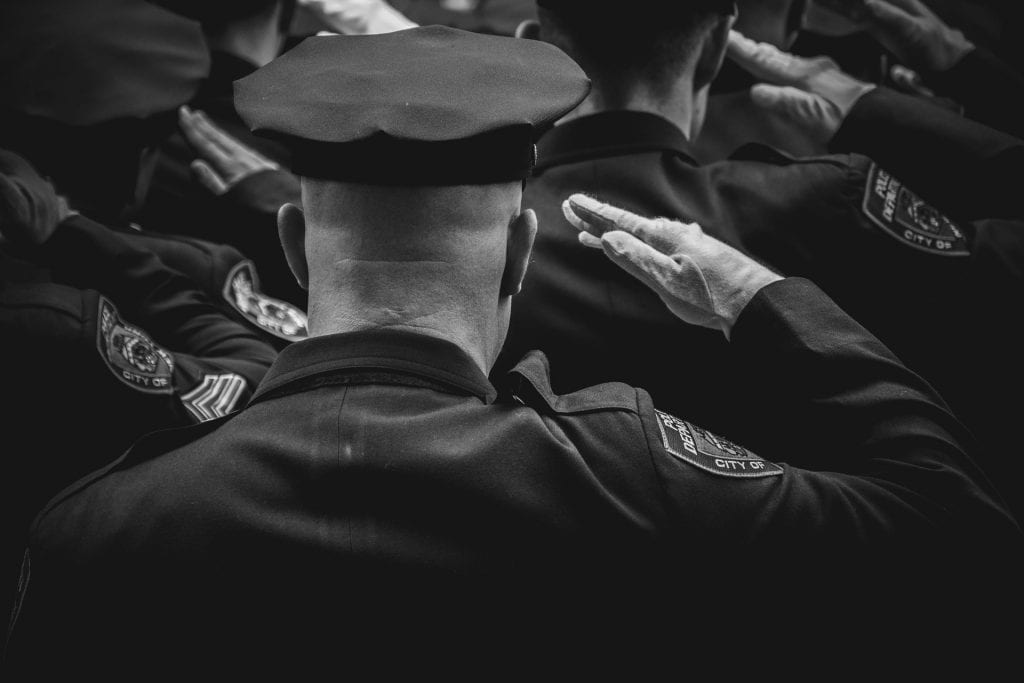
Across the criminal justice landscape, the law enforcement professionals of today are facing challenges unlike ever before. Criminal enterprises are becoming more complex and their methods require new skills to thwart properly. Because of these rising challenges, a law enforcement degree has never been more valuable to long term success.
Many years ago, police and other law enforcement workers did not need a college degree, but many organizations are starting to favor candidates with some form of higher education under their belts. As someone in law enforcement begins to spend several years working in the field, they may be thinking about their options to move up in their careers.
As far as career advancement goes, pursuing a Bachelor’s or Master’s degrees is one of the most straightforward ways to reach a new level as a professional. It requires considerable effort and resources to do so, but here are seven of the top degrees police and law enforcement officers can pursue to advance their careers.
1. Psychology
Psychology is a good choice because it involves many areas of study including human behavior, social behaviors, and the root causes of crime. If you have a Bachelor’s degree in psychology, you will be well on your way to a rewarding career in the criminal justice field.
There are many different concentrations that you can choose to focus on once you get your Bachelor’s degree in psychology. Some of these include but are not limited to forensic psychology, social work, counseling, and school psychology. If you want to serve as an officer in a rural police department, forensic psychology is a good choice for you. School psychology addresses all of the issues that teachers, parents, and students face when dealing with schools from a professional perspective.
Getting a degree in this field can lead to a rewarding career as a police officer or any other law enforcement position. If you are interested in a career in forensic psychology, you will be qualified to evaluate crime scenes and evaluate the victims. If you already have experience working in a more generalized criminal justice position, such as a private detective or security guard, getting a master’s degree may be more helpful to your career ambitions.
2. Sociology
The relationship between sociology and law enforcement is not always a simple one. While the former often pertains to analyzing criminal justice from a cultural perspective, focusing on the individual element of criminal behavior, such as why a person breaks the law, and how society is influenced by that behavior, there is no easy answer to this question. However, law enforcement officials certainly can gain a great deal from a solid sociology education to inform their insight about why people break the law. This knowledge is especially important when it comes to implementing changes in policing, like body-worn cameras, for example. Police officers must learn the limits of their authority and the societal consequences of unlawful behavior.
Also, the issue of social class often arises when considering the relationships between law enforcement and sociology majors. Although the two often come together to address many complex issues of contemporary life, there is often a division of opinion concerning which is the better choice for those seeking a profession in this area. For some, working with both criminal justice professionals and sociology experts provides an enriching experience that helps them develop into more competent professionals.
3. Criminology
It’s no wonder that Criminology is one of the most sought-after degrees for students seeking to pursue a career in law enforcement. This is a common avenue for police officers, detectives, enforcement agents, and more.
While psychology and sociology are great options for a degree, many of those working in law enforcement will probably find pursuing a Bachelor’s or Master’s degree in Criminology might be a more appropriate choice. Criminology focuses on the conceptual and theoretical reasoning in order to explain criminal behavior.

The idea is that if we have a better understanding of why criminals do what they do, police and law enforcement agencies can adapt and possibly mitigate future crimes. Getting a Master’s in criminology can really help current police officers get a leg up in their careers more so than most other degrees, but there are a few other degrees to consider.
4. Criminal Justice as a Law Enforcement Degree
Similar to seeking a degree in Criminology, a degree in criminal justice can also be a helpful stepping stone to reach the next level in your career. Rather than trying to understand the motivations and behavior of criminals, criminal justice is a broader concentration which covers the multiple facets of this field.
It is another common degree among law enforcement professionals as students of criminal justice will develop a better understanding of courtroom procedures, criminal laws, and procedures, and increase their knowledge about the entire criminal process from arrest to incarceration. This degree is a solid choice for police officers looking to take on leadership roles.
5. Foreign Language Degrees
With America being the melting pot that it is, the number of communities with large populations of minorities continues to grow exponentially every day. Police have the challenging task of not only upholding the law, but they must also delicately balance how they interact with their communities. The U.S. is still a largely English-speaking country, but in certain towns and larger cities, not all citizens speak this common language.
For those who work for local law enforcement organizations, having more officers who speak more than one language can be extremely helpful in maintaining positive relationships with the public. This is where seeking a degree in a foreign language can be a good alternative for police officers looking to advance their careers.
6. Law Enforcement Degree In Public Safety Leadership
Another valid degree to consider is one in law enforcement and public safety leadership. This type of degree is relatively new since it was crafted for those seeking to be stronger leaders in their field. It’s not offered by very many universities, which does impact how affordable obtaining said degree will be, but it can still advance your career.
Not only will this degree deepen knowledge pertaining to law enforcement, but it will also educate students on the principles of planning and project management in order to effectively manage police resources and protect the public.
7. Law
While police officers need to have some understanding of laws and legal procedure, they often only need a good working knowledge of criminal law. But for police officers looking to move up in their career, studying law has quite a few benefits.

For one, a law degree could position you to become an academy educator or instructor for new recruits. By educating new police officers, you can teach these individuals on how to avoid certain pitfalls which can negatively impact official investigations. Proper education can also protect a law enforcement agency from legal liabilities in the form of officers committing unlawful acts in the course of duty.
8. Computer Science
The criminals of today are always advancing their methods, and so law enforcement has to adapt. Computer science and overall cybersecurity coursework will give police officers a set of skills to help them advance their careers.
From hackers to organized crime, law enforcement officers need to understand the technology used by criminals which threaten the lives of everyday citizens. With a degree in the areas of computer science, computer engineering, and Internet technologies, candidates will make themselves more valuable than those who are only experienced in traditional police work.
9. Finance or Accounting
Whether you’re wanting to branch out into a leadership role or you are looking into a role that seeks to thwart criminals behind financial crimes, there are several options to consider as far as getting a degree.
In the realm of finance and accounting, police officers with an advanced degree can become good candidates for leadership roles where planning and resource management are key. But if you’ve ever wanted to take the path to a job with a federal law enforcement agency, they are always on the lookout for candidates with degrees in finance and accounting.
10. Forensics
While the majority of police work involves stopping crimes, often crime scene investigators are also called into other situations including the scene of a death or accident. A forensic scientist will use a variety of tools to determine the cause of a crime or the behavior of a person after the event. Forensic science is also commonly referred to as forensic chemistry, forensic physics, forensic psychology, or forensic computer science.
11. Political Science
In today’s society, many people look at crime and criminal justice through the lens of social influence. Police departments must react quickly and efficiently to public opinion, as much of the public is always concerned about the place of police officers within society and about what they are doing to protect the public. A four-year degree in political science can help police departments meet these needs by educating them about the societal factors that influence crime and how police officers can affect them. In turn, a police officer who has studied political science can become a better representative of the public.
Selecting a Law Enforcement Degree
Before jumping into a degree that interests you, try to audit yourself and understand where you are really skilled and if you can apply it to your career. Some degrees make a lot of sense for police and law enforcement professionals, but that doesn’t mean they are the right choices for you. With the changing landscape of law enforcement career paths, it is important for officers and agents to be adaptable to changes in the future of law enforcement.
Envision where you want your career to go, what criminology degree jobs are a good fit for you, and pick a degree that will help you get there. To learn more about how West Liberty can put you on the path to advancing your career in law enforcement, talk to us to see what a Master’s in Criminology can do for you.